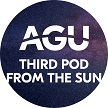E14 – Bonus Clip: Supporting Women in Science
Check out this bonus clip from our most recent episode, Footprints from an Ancient World, where Renata Netto talks about what it’s like to be a woman in her field.
Episode Transcript
Shane Hanlon: Hi, Nanci.
Nanci Bompey: Hey.
Shane Hanlon: We’re back.
Nanci Bompey: We’re back, we’re back. We have a bonus clip from our most recent episode, Footprints From an Ancient World, with our guest scientist, who was Renata Netto, and it’s actually very timely. She’s discussing about what it’s like to be a woman in her field, and today is actually the International Day of Women and Girls in Science.
Shane Hanlon: Great.
Renata Netto: What happens with those that study Ichnology is, we have to spend a lot of time in the field. Sometimes, we spend more time in the field trip than with our family. So, when my daughter was young, a child, my husband was the mother that they … And, I remember that lots of birthdays, birthday parties that she went to, invited, and I was not at home to dress her properly. When I arrived from a trip, a friend of mine said, “Oh, you’d be very sad to see how your daughter went to the party that day,” because my husband just dressed like he liked it.
You see, when you’re a woman and you are in science, and you have this kind of job that you have to travel a lot, and you have kids, it’s hard. It’s not easy. It’s not an easy decision if you go or if you stay. If you don’t have the support to make your job, if your job implies that you have to travel a lot, it’s not easy. And maybe, for this reason, many women prefer to work in labs, or do some sort of job that they don’t need to be in field trips for a while.
I spend 40% of my time, at least, traveling. It’s a lot. I’m passionate by my work, and I’m really lucky to have the chance to develop my research in the field that I like, and have the support of my institution and my family. Many women, they don’t have this kind of lucky, or they don’t have someone to support them when they need to travel and the children are at home. So, I really appreciate that support that I have. I think it’s an important thing to think about because science is important for society. Some sciences are more important than others in the way they impact directly the society, but all science is relevant.
Liza Lester: What made you excited about fossils or geology when you started your career?
Renata Netto: Well, to be honest, when I started my career, I never imagined that I would work with Ichnology or even that I would work with sedimentary geology. My background is biology, and at that time, my focus was to be a National Geographic explorer or something like this. It was my dream. Only a dream because at that time, in Brazil, to be a National Geographic explorer or photographer or something like this, was kind of impossible. But, I had a chance to work as a practice assistant to a professor, and this professor, he really liked sedimentary structures. He was committed to make a kind of atlas in Portuguese to people that study sedimentary geology, have access to the main sedimentary structures, and have no problems with the language barrier, because we have an atlas, a beautiful one, but it was written in English. So, he decided to make a similar publication in Portuguese.
He asked me if I would like to help with the biogenic sedimentary structure. Oh gosh. It was absolutely complicated, very difficult. I felt like, “Oh, I cannot do it.” But, at the same time it was challenging. I couldn’t say to him that I couldn’t do it, so I started to study and it was becoming a little bit fascinating.
If you have a scientist at your home, support them, especially if it’s a woman because she has the right to have a family, to have children, and if she has good support she will do her job in a very, very passionate way, and certainly she will contribute a lot for science. We have to improve the number of women in science in the world in all sciences, but specifically in geosciences because we are still less than a third comparing the universe of geosciences.
Shane Hanlon: Thanks everyone, and be sure to check out the whole episode, Footprints From an Ancient World.
